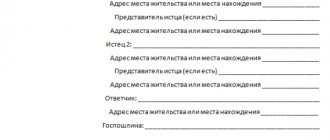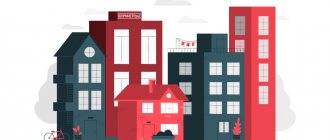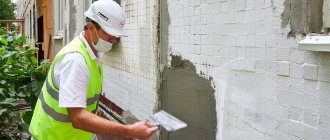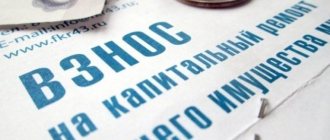Legal disputes involving a regional overhaul operator are usually of two types: the operator collects debt on contributions for repairs or the operator collects debt under construction contracts. But practice is much more varied. Lawyer of MCA "Arbat" Vadim Bashir-Zade selected and analyzed the most interesting cases involving the registrar, management company and homeowners' association.
Management company experience: how to achieve major repairs of houses ahead of schedule
43831
Dispute about non-acceptance of documents on choosing the method of forming a capital repair fund
First, we will consider a dispute between a homeowners’ association and a regional capital repair operator regarding the failure to accept documents on the choice of method for forming a capital repair fund. Resolution 2 of the ACC dated January 27, 2020 No. A82-11230/2019 is about this.
The regional operator's HOA account had accumulated a significant amount of money, with which the owners decided to carry out major repairs of the apartment building. An extraordinary general meeting of owners was held to change the method of forming the capital repair fund from the reoperator's account to a special account of the HOA.
A special bank account was opened and documents were submitted to the operator. However, the regional operator refused to accept the documents. The HOA went to court.
The regional operator claimed that
- the submitted package does not contain a document confirming the fact that the owner of the special account manages the house;
- the agenda of the meeting does not include the wording of the question about the owner of the special account;
- The owners' decisions on the agenda items are not attached.
It was confirmed in court that the owners did not decide to determine the procedure for submitting payment documents, which is the basis for refusing to change the method of forming the capital repair fund. In addition, there was no register of delivery of notices about holding a general meeting to the owners of premises in an apartment building.
As a result, the court refused to satisfy the HOA's demands. The appellate instance upheld the decision.
Can the management company recover the cost of emergency major repairs from the reoperator?
109856
What could be the consequences of non-payment?
- Failure to pay for major repairs will result in penalties for the owner, namely the accrual of penalties . You can see the fine by receiving a receipt from the housing and communal services department. The accrual of penalties, as a rule, begins six months after the owner fails to pay for repairs.
INFO! The size of the fine and the period after which it begins to accrue differ in each subject of the Russian Federation and are established by local authorities.
- In addition to a fine, for persistent defaulters of major repairs, ignoring this obligation may result in a claim from the fund . According to the Law, the owner can file a counterclaim to challenge the fund's claim. However, as practice shows, in the overwhelming majority of cases, the tenant fails to defend his opinion and the fund collects from him the full amount of debt under the Kyrgyz Republic.
- If after this the owner continues to ignore the obligation to pay for major repairs and the resulting debt, the next penalty will be the seizure of personal property (to repay the debt) or blocking of a bank account . In this case, the debtor will have to pay not only the debt for major repairs, but also the services of a legal specialist to protect his interests in court.
- An owner with a debt for major repairs may have difficulties selling an apartment . When receiving certificates from the housing and communal services department, its employees may refuse the tenant, citing the need to repay the debt under the Kyrgyz Republic (for legitimate reasons). A potential buyer of an apartment will also require the buyer to provide documents confirming the absence of any encumbrances on the acquired real estate, in particular the existing debt for major repairs;
- Imposing a ban on leaving the country . A similar measure can be applied if the amount of debt for major repairs exceeds ten thousand rubles;
- Eviction from the apartment. This is quite an extreme measure, which can only be applied if the amount of debt incurred for major repairs amounts to the market value of the property. The fund can achieve the eviction of a persistent defaulter only in court by filing an appropriate claim. First, the home is put up for sale, after which the amount of debt, legal costs, penalties, etc. are added. If after paying off all the above items there is some amount of money left, it is not transferred to the account of the former owner of the apartment.
Dispute regarding the provision of documents related to the opening and maintenance of a special account
The second dispute also occurred between the regional operator and the homeowners' association. It is about the obligation to provide documents and information related to the opening and maintenance of a special account. Based on the materials of Resolution 16 of the AAS dated March 23, 2020 in case No. A22-1762/2019.
At a meeting of owners of apartment building premises, a method for forming a capital repair fund in a special account was determined. The owner of the special account was the HOA.
Three years later, the city administration adopted a resolution regarding this house on the formation of a capital repair fund on the account of the regional operator. Considering that there were funds remaining in the HOA’s special account, the operator went to court with demands to transfer the balance to him, as well as to provide documents and information related to the maintenance of this account.
The court found no grounds to satisfy the regional operator's claims. In the decision, the department referred to the current housing legislation, as well as to the resolution of the Constitutional Court of the Russian Federation dated April 12, 2016 No. 10-P, according to which the choice of the method of forming a capital repair fund for common property in an apartment building is the result of the free will of the owners.
The appellate court agreed with the findings of the lower court, leaving the regional operator's complaint unsatisfied.
Appeal ruling dated December 28, 2016 Velikiye Luki
Case No. 11-4/2014 APPEAL DECISION October 15, 2014 village. Veydelevka Veydelevsky District Court of the Belgorod Region, composed of: presiding judge Zhukova N.M. under secretary Shevchenko O.R. with the participation of: defendant – Strekozova V.A. Having considered in open court a civil case brought by the Housing and Utilities Reform Fund <address> against V.A. Strekozova. on the collection of arrears in payment of the contribution for major repairs on the appeal of the executive director of the Fund for Assistance to the Reform of Housing and Public Utilities <address> against the decision of the magistrate of the judicial district No. 1 of the Veydelevsky district dated June 24, 2014, established: DD. MM.YYYY, the Fund for Assistance to the Reform of Housing and Communal Services <address> filed a claim in the magistrate's court, which asked to recover from Strekozova V.A. debt to pay the contribution for major repairs for the period from DD.MM.YYYY to DD.MM.YYYY in the amount of No. rubles. By the decision of the acting magistrate judge of judicial district No. 1 of the Veidelevsky district dated June 24, 2014, the claims were denied. Having disagreed with the decision of the magistrate, the executive director of the Fund for Assistance to the Reform of Housing and Communal Services <address> asks the court to cancel this decision, due to the incorrect application of the rules of substantive law by the court, and to make a new decision in the case, by which to recover from the defendant V.A. Strekozova. in favor of the Housing and Utilities Reform Assistance Fund <address> arrears in payment of the contribution for major repairs for the period from DD.MM.YYYY to DD.MM.YYYY in the amount of No. rubles. Based on the provisions of Part 1 of Art. 327.1 of the Civil Procedure Code of the Russian Federation, the appellate court considers the case within the limits of the arguments set out in the appeal, presentation and objections to the complaint, presentation. Regardless of the arguments contained in the appeal, the appellate court checks whether the court of first instance violated the rules of procedural law, which, in accordance with Part 4 of Article 330 of this Code, are grounds for canceling the decision of the court of first instance (Part 3).
The plaintiff did not send his representative to the court of appeal, notifying in writing that the arguments of the appeal were fully supported, and asked to cancel the decision of the magistrate and satisfy the claims. Defendant Strekozova V.A. at the court hearing, she considered the decision of the magistrate to be legal and justified, and considers the defendant’s appeal not subject to satisfaction on the grounds that she did not enter into any agreement with the Housing and Communal Services Reform Assistance Fund and did not dispute the fact that the object, that is, the apartment for which she must pay payment of utility bills is the same, from the moment of its acquisition from DD.MM.YYYY year, the area of which is No. sq.m. Based on the results of consideration of the complaint and verification of the arguments of the participants in the process, the appellate court comes to the conclusion that the decision of the acting magistrate judge of judicial district No. 1 of the Veidelevsky district dated June 24, 2014 should be canceled and a new decision should be made in the case. In accordance with part 1, 3 of Art. 158 of the Housing Code of the Russian Federation, the owner of premises in an apartment building is obliged to bear the costs of maintaining the premises belonging to him, as well as to participate in the costs of maintaining common property in an apartment building in proportion to the share in the right of common ownership of this property by paying fees for the maintenance and repair of residential premises and contributions for major repairs. The obligation to pay the costs of major repairs of an apartment building applies to all owners of premises in this building from the moment ownership of the premises in this building arises. The right of the owners of premises in an apartment building to the funds of the capital repair fund, formed from their contributions, is specified in section IX of the Housing Code of the Russian Federation, according to which the capital repair fund is formed by transferring contributions from premises owners to a specialized account or by transferring them to the account of a regional operator (Article 170 Part 3 of the Housing Code of the Russian Federation). According to Art. 154 part 2 of the Housing Code of the Russian Federation, payment for residential premises and utilities for the owner of premises in an apartment building includes payment for the maintenance and repair of residential premises, including payment for services and work on managing an apartment building, maintenance, and routine repairs of common property in apartment building, contribution for major repairs, payment for utilities. According to the Order of the Government of the Belgorod Region dated March 18, 2013 No. 108-rp “On amending the order of the Government of the Belgorod Region dated June 25, 2012 No. 336-rp, the Housing and Communal Services Fund <address> is vested with the functions of a regional operator carrying out activities aimed at ensuring major repairs of common property in apartment buildings. Since the owners of the premises in the multi-apartment <address> did not decide on the method of forming a capital repair fund, by Decree of the administration of the Veydelevsky district of the Belgorod region No. 227 dated September 27, 2013, in accordance with Part 7 of Article 170 of the Housing Code of the Russian Federation, a decision was made to form a fund capital repairs, on the account of the regional operator, which in the Belgorod region is the Housing and Communal Services Reform Assistance Fund.
As follows from the certificate of the administration <data taken> of the rural settlement dated DD.MM.YYYY and an extract from personal account No. No., Strekozova V.A. lives in a one-room apartment at the address: <address>, which belongs to her by right of ownership. Certificate of registration of right No. No. dated DD.MM.YYYY confirms the ownership of V.A. Strekozova. for a one-room apartment with a total area of sq.m., located at <address>. To eliminate the discrepancy between the address information of the property indicated in the certificate of state registration of rights dated DD.MM.YYYY Series <address> with the actual address of the property, the plaintiff presented additional evidence to the court of appeal: resolution of the administration of the Viktoropol rural settlement No. dated DD.MM.YYYY and a certificate from the administration <data taken> of the rural settlement No. dated DD.MM.YYYY. In accordance with paragraph 2 of part 1 of Article 327.1 of the Civil Procedure Code of the Russian Federation, the appellate court evaluates the evidence available in the case, as well as additionally presented evidence. Additional evidence is accepted by the court of appeal if the person participating in the case has justified the impossibility of presenting it to the court of first instance for reasons beyond his control, and the court recognizes these reasons as valid. In the appeal, the plaintiff substantiated the reasons for not submitting these documents to the court of first instance. The court comes to the conclusion that it is necessary to accept additional evidence in the form of the above documents, since the plaintiff did not have the opportunity to transfer these documents to the court of first instance for good reasons, due to the impossibility of quickly establishing the fact that the defendant’s actual address corresponds to the information available in the certificate of state registration of rights, and also due to the absence of these documents from the appellant at the time of the adoption of the appealed court decision. The resolution of the administration <data taken> of the rural settlement No. dated DD.MM.YYYY and certificate No. dated DD.MM.YYYY confirms that the one-room apartment belonging to V.A. Strekozova. and located at <address>, as indicated in the certificate of ownership, has been assigned a different address: <address>. The evidence collected in the case indisputably confirms the ownership of the defendant V.A. Strekozova. to <address>. The fact of residence and ownership of residential premises at the specified address is the defendant Strekozova V.A. didn't deny it. Since Strekozova V.A. is the owner of an apartment with a total area of No. sq.m., then he is obliged to make a monthly contribution to the formation of a fund for capital repairs of the common property of an apartment building in the amount of No. ruble No. kopecks (<data taken>) The calculation of the debt is determined based on the amount of the contribution established by the Resolution Government of the Belgorod Region No. 486-pp dated November 25, 2013 “On establishing the minimum amount of contribution for major repairs of common property in apartment buildings in the Belgorod Region for 2014”, according to which the amount No. rub. per 1 sq. meter of total area of residential (non-residential) premises. According to the requirements of Article 181 Part 1 of the Housing Code of the Russian Federation, if the decision on the formation of a capital repair fund and on the organization of capital repairs on the account of a regional operator is made by a local government body, then the obligation to conclude an agreement with the regional operator on the formation of a capital repair fund and on the organization of carrying out major repairs, in accordance with Art. 445 of the Civil Code of the Russian Federation, is assigned to the owners of premises in an apartment building. The magistrate unlawfully accepted the arguments of the defendant V.A. Strekozova. about the plaintiff’s failure to comply with the procedure for concluding an agreement, referring to the absence of her signature in the documents and unreasonably came to the conclusion that the plaintiff did not prove the fact that the defendant had an obligation to make contributions to the account of the regional operator for major repairs for the period from DD.MM.YYYY to DD.MM .YYYY in the amount No. ruble No. kopecks. Taking into account the provisions of Art. Art. 209, 249, 309 of the Civil Code of the Russian Federation, the absence of contractual relations between the parties to the dispute cannot be the basis for the release of the defendant V.A. Strekozova, as the owner of the premises, from the obligation to pay the specified fee and maintain the common property in proportion to her share, which is a consequence of the right of ownership itself and as a civil - legal monetary obligation, arises by force of law. In accordance with Art. 88.98 of the Code of Civil Procedure of the Russian Federation from the defendant in favor of the plaintiff in order to reimburse expenses incurred by the plaintiff in connection with the payment of the state duty when filing an appeal, a sum of money in the amount of No. rubles is subject to recovery. Since no evidence was presented to the court that the plaintiff paid the state fee when filing the claim and that the amount was subsequently recovered from the plaintiff, the defendant is subject to recovery in the local budget of rubles No. Guided by Art. Art. 327-329 of the Code of Civil Procedure of the Russian Federation, the court DECIDED: The decision of the acting magistrate judge of court district No. 1 of the Veidelevsky district dated June 24, 2014 in a civil case on the claim of the Fund for Assistance to the Reform of Housing and Communal Services <address> to Strekozova V.A. on the collection of arrears in payment of the contribution for major repairs - cancel, make a new decision on the case, according to which: Collect from Strekozova V.A. in favor of the Fund for Assistance to the Reform of Housing and Communal Services <address> arrears in payment of the contribution for major repairs for the period from DD.MM.YYYY to DD.MM.YYYY in the amount of No. rubles No. kopecks, state duty in the amount of No. rubles in the order of return of the paid state duty, in total to collect No. (<data taken>) ruble No. kopecks. Collect from Strekozova V.A. to the budget of the municipal district “<address>” a state duty in the amount of No. (<data taken>) rubles.
Collected from Strekozova V.A. transfer the amount of state duty in the amount of No. rubles to the Fund for Assistance to the Reform of Housing and Communal Services <address>, <data taken>. Collected from Strekozova V.A. transfer the amount of debt in the amount of ruble no. no. kopecks to the Fund for Assistance to the Reform of Housing and Communal Services <address>, <data taken>. The determination comes into force from the date of its adoption.
Dispute regarding collection of remuneration under an agency agreement
The third dispute occurred between the management organization and the regional operator and concerned the collection of remuneration under the agency agreement. The conclusions in case No. A41-111450/2019 dated 06/11/2020 were made by the AS MO.
The management organization entered into an agency agreement with the regional operator. His subject was
- activities for accrual, collection and processing of contributions for major repairs of common property in apartment buildings;
- delivery of payment documents to property owners;
- conducting claims work for the purpose of collecting and collecting debt on contributions for major repairs.
The MA sent certificates of services rendered to the regional operator, however, the operator did not fulfill its obligations to pay remuneration.
Since the regional operator did not provide a reasoned refusal, and the operator did not provide evidence of payment of the agency fee, the management organization’s demands were satisfied by the court in full.
Can the bank write off the HOA’s debt from the special capital repair account?
75720
Procedure
If the property of the owners in your apartment building was damaged due to major repairs, advise them on the following course of action.
- Drawing up an inspection report. Specialists from your management organization will need to participate in the inspection.
- Damage assessment. Damage assessment is paid and done by a specialist. The assessment is carried out at the expense of the owner.
- Claim. You can try to offer the regional operator to voluntarily compensate for the damage in a pre-trial manner.
- Dispute settlement before trial. Refer to the evidence from this case. Perhaps this will work.
- Court. If the case is similar, don't be afraid to go all the way to the Supreme Court.
The management company and the homeowners association will strive for independence from the operator
Arbat MCA lawyer Vadim Bashir-Zadeh comments on judicial practice:
“The bulk of legal disputes with regional operators of capital repairs will remain quite common in the future: management organizations will continue to hold operators accountable under construction contracts, and they will collect arrears from management companies regarding contributions for capital repairs.
Some controversial situations will arise when the management organization or HOA creates a special account for transferring contributions for major repairs. I assume that more and more management companies and homeowners associations will independently charge contributions to a special account for later use. This trend towards independence from regional operators in matters of major repairs is already visible.”
Is it possible to avoid paying legally?
In accordance with current legislation, some categories of citizens are exempt from the need to pay bills for major repairs. These include:
- WWII veterans;
- honorary citizens of the region and country;
- owners of emergency housing (officially recognized);
- owners of primary housing;
- citizens who have passed the eighty year mark;
- residents of non-privatized housing;
- other categories of citizens approved by local authorities.
The funds in the special accounts of the MA do not belong to her and cannot be written off against her own debts
In Art. Art. 175, 176 of the Housing Code of the Russian Federation there are no additional requirements for the financial position of the management organization as the owner of a special account for major repairs. The question of its finances is important only in a situation where the UO is declared bankrupt. Then the owners choose a new account holder.
But, as the lawyers of the P1 Association note, in practice, due to restrictions on operations imposed by the authorities on the MA itself, banks refuse to open special accounts for it, and if they are already open, they write off funds from them according to writs of execution.
At the same time, there is practice of the Supreme Court of the Russian Federation, in which it indicates the special purpose of funds received from residents of houses to the accounts of the management authority for major repairs or for utilities. This position was formulated by the RF Armed Forces:
- In the ruling dated October 13, 2016 No. 303-KG16-10101 in case No. A24-2370/2015 in relation to the capital repair fund.
The bank, using writs of execution, wrote off the debts of the management company from a special account for the overhaul of an apartment building. The company filed a lawsuit demanding that the actions of the credit institution be declared illegal.
All authorities sided with the UO. The Supreme Court of the Russian Federation noted that the bank is obliged to comply with the bailiff's order to write off funds belonging only to the debtor and not to other persons. Funds received in a special account have a designated purpose and cannot be recognized as money from the management organization.
- In the ruling dated July 28, 2016 No. 309-ES16-8361 in case No. A71-6621/2015 regarding an account for accepting payments for utility services.
The UO owed its suppliers payment for utilities, and the water utility filed a lawsuit. The bank, according to the writ of execution, debited funds from the account where consumer payments were received for all utilities provided in the apartment building.
The management organization indicated in the claim that it is a paying agent, and the funds in the account do not belong to it. Courts of all instances, including the Supreme Court of the Russian Federation, confirmed this position. The money located in the special bank account of the paying agent has a designated purpose. They:
- designed for all utility providers, not just water utilities;
- cannot be recognized as belonging to the management company and written off in favor of the enterprise as one of the suppliers.
Both definitions of the RF Armed Forces show that the funds located in the special accounts of the MA do not belong to it. Therefore, in relation to them, as well as in relation to the accounts themselves, the bank cannot take actions aimed at repaying the debt - under contracts, for taxes and fines - of the management organization itself.
What issues regarding the overhaul of apartment buildings are not regulated in the regulatory legal acts and how to solve them
Violation 2: absence of a decision by the GSM or lack of a quorum of votes at the meeting
The second violation that special account owners often commit is carrying out major repairs of common property in an apartment building in the absence of a decision by the general meeting of apartment owners, or in the absence of a quorum.
Making decisions on major repairs of apartment buildings and on the use of the capital repair fund is within the competence of the general meeting of owners (Part 2 of Article 44 of the Housing Code of the Russian Federation). Without OSS, the owner of a special account cannot spend the funds accumulated in the special account.
A quorum of at least 2/3 of the total number of votes of the owners in the house is needed to establish the amount of the contribution for major repairs, more than the minimum, to decide to take out a loan or a loan (clauses 1.1–1, 1.2, part 2, article 44 of the Housing Code of the Russian Federation , part 1 of article 46 of the Housing Code of the Russian Federation).
Decisions on how the capital repair fund will be formed, who will open a special account, must be voted “for” by OSS participants who have a majority of votes from the total number of votes in the house (Clause 1.1, Part 2, Article 44, Part 1, Article 46 of the Housing Code RF). By a simple majority of 50% + 1 vote of the number of votes of meeting participants, decisions are made on the following issues:
- approve the list of works and services, terms, estimates, contractor;
- determine the procedure for providing payment documents for payment of contributions for major repairs;
- select a credit organization to open a special account, approve the text of the agreement with such organization.
How to prevent violations: strictly follow the procedure for organizing major repairs and conducting OSS, and carefully approach quorum calculations. We recommend holding the meeting in person or in absentia in order to accurately obtain a quorum if few owners will be present at the physical part.
What should the management company do to collect a quorum at the general meeting of owners?
Our recommendations for all special account holders
We have analyzed the list of the most frequent violations that were committed by management entities, homeowners' associations and cooperatives as owners of special accounts, using the example of the practice of the GZhN body from Udmurtia. This list may be expanded or shortened depending on the region. General recommendation for all managers of buildings where the owners of the premises accumulate a fund in a special account:
- Carefully study the federal and regional requirements for maintaining a special account.
- Assign a responsible person to ensure compliance with these requirements, deadlines and necessary procedures.
- If the State Housing Inspectorate during an inspection recorded a violation that you did not commit, defend your rights with the help of claims and a lawsuit in court.
Next week we will review the violations committed by redevelopment operators and give advice on how management and homeowners associations can work with them for the benefit of the owners of premises in the house.
If in your practice there have been instructions from the State Housing Authority regarding the maintenance of special accounts, positive court decisions to challenge them, send them to us at We will select cases that are useful for house managers and review them.
You can also send us ready-made material for publication and become our author: to do this you need to take four simple steps.







